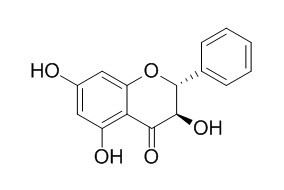Pinobanksin
Pinobanksin and some of its ester derivatives from Sonoran propolis have apoptotic induction in a B-cell lymphoma cell line. Pinobanksin possesses considerable antimutagenic properties against ofloxacin-induced bleaching of E. gracilis. Pinobanksin inhibits peroxidation of low density lipoprotein and it has electron donor properties reducing alpha-tocopherol radicals.
Inquire / Order:
manager@chemfaces.com
Technical Inquiries:
service@chemfaces.com
Tel:
+86-27-84237783
Fax:
+86-27-84254680
Address:
1 Building, No. 83, CheCheng Rd., Wuhan Economic and Technological Development Zone, Wuhan, Hubei 430056, PRC
Providing storage is as stated on the product vial and the vial is kept tightly sealed, the product can be stored for up to
24 months(2-8C).
Wherever possible, you should prepare and use solutions on the same day. However, if you need to make up stock solutions in advance, we recommend that you store the solution as aliquots in tightly sealed vials at -20C. Generally, these will be useable for up to two weeks. Before use, and prior to opening the vial we recommend that you allow your product to equilibrate to room temperature for at least 1 hour.
Need more advice on solubility, usage and handling? Please email to: service@chemfaces.com
The packaging of the product may have turned upside down during transportation, resulting in the natural compounds adhering to the neck or cap of the vial. take the vial out of its packaging and gently shake to let the compounds fall to the bottom of the vial. for liquid products, centrifuge at 200-500 RPM to gather the liquid at the bottom of the vial. try to avoid loss or contamination during handling.
Food Chem.2021, 377:131976.
Pharm Biol.2016, 54(7):1255-62
JAOCS2021, 98(7):779-794.
Food Res Int.2022, 157:111397.
Eur J Pharmacol.2023, 960:176121.
Sci Rep.2021, 11(1):10931.
J. Food Composition and Analysis2022, 114:104731
J Mol Recognit.2020, 33(2):e2819
Environ Toxicol.2019, 34(12):1354-1362
Pharmaceuticals (Basel).2021, 14(3):260.
Related and Featured Products
Mutat Res. 1998 Aug 7;416(1-2):85-92.
The effect of flavonoids on ofloxacin-induced mutagenicity in Euglena gracilis.[Pubmed:
9725994]
METHODS AND RESULTS:
The antimutagenicity of 14 naturally occurring flavonoids (20 mumol/l) on ofloxacin (43 mumol/l and 86 mumol/l)-induced bleaching (mutagenicity) was studied in Euglena gracilis. The flavonoids chrysin, techtochrysin, chrysin-5-methylether galangin, galangin-5-methylether, pinocembrin and Pinobanksin possess considerable antimutagenic properties against ofloxacin-induced bleaching of E. gracilis.
CONCLUSIONS:
Apigenin and isalpinin had only weak antimutagenic potency. Pinobanksin-5-methylether and Pinobanksin-3-acetate showed very weak or no antimutagenic effect. However, kempferol, quercetin-3-methylether and quercetin-3,3'-dimethylether showed co-mutagenic or no antimutagenic effect depending on the concentration of ofloxacin. Two possible modes of action of the flavonoids on ofloxacin-induced bleaching of E. gracilis are discussed.
Chem Biol Interact. 2015 Dec 5;242:35-44.
Apoptotic induction by pinobanksin and some of its ester derivatives from Sonoran propolis in a B-cell lymphoma cell line.[Pubmed:
26367700]
Propolis is a resinous substance produced by honeybees (Apis mellifera) from the selective collection of exudates and bud secretions from several plants. In previous works, we reported the antiproliferative activity of Sonoran propolis (SP) on cancer cells; in addition we suggested the induction of apoptosis after treatment with SP due to the presence of morphological changes and a characteristic DNA fragmentation pattern. Herein, in this study we demonstrated that the antiproliferative effect of SP is induced through apoptosis in a B-cell lymphoma cancer cell line, M12.C3.F6, by an annexin V-FITC/Propidium iodide double labeling. This apoptotic effect of SP resulted to be mediated by modulations in the loss of mitochondrial membrane potential (ΔΨm) and through activation of caspases signaling pathway (3, 8 and 9). Afterward, in order to characterize the chemical constituents of SP that induce apoptosis in cancer cells, an HPLC-PDA-ESI-MS/MS method followed by a preparative isolation procedure and NMR spectroscopy analysis have been used. Eighteen flavonoids, commonly described in propolis from temperate regions, were characterized. Chrysin, pinocembrin, Pinobanksin and its ester derivatives are the main constituents of SP and some of them have never been reported in SP. In addition, two esters of Pinobanksin (8 and 13) are described by first time in propolis samples in general. The antiproliferative activity on M12.C3.F6 cells through apoptosis induction was exhibited by Pinobanksin (4), Pinobanksin-3-O-propanoate (14), Pinobanksin-3-O-butyrate (16), Pinobanksin-3-O-pentanoate (17), and the already reported galangin (11), chrysin (9) and CAPE. To our knowledge this is the first report of bioactivity of Pinobanksin and some of its ester derivatives as apoptosis inducers. Further studies are needed to advance in the understanding of the molecular basis of apoptosis induction by SP and its constituents, as well as the structure-activity relationship of them.
Pharmazie. 1997 Jul;52(7):566-7.
Pinobanksin inhibits peroxidation of low density lipoprotein and it has electron donor properties reducing alpha-tocopherol radicals.[Pubmed:
9266597]
METHODS AND RESULTS:
Pinobanksin inhibits peroxidation of low density lipoprotein and it has electron donor properties reducing alpha-tocopherol radicals.



